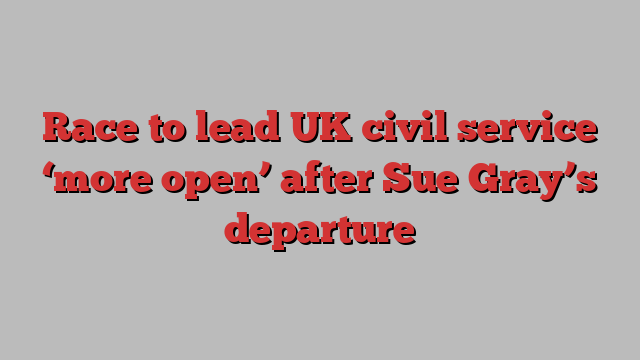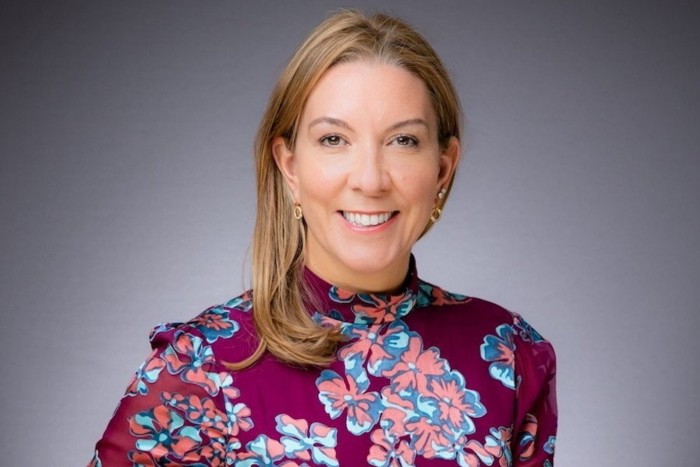
The exit of Sue Gray as Sir Keir Starmer’s chief of staff has shaken up the contest for the next cabinet secretary, with officials predicting a female candidate is now likelier to win.
There was a perception among Whitehall officials that Gray favoured Sir Olly Robbins, a former senior mandarin who served previously as Europe adviser to Theresa May, for the £200,000-a-year job.
A raft of Labour officials and civil servants believe that Gray’s departure from Downing Street on Sunday, following months of infighting and negative briefings, may have an impact on the race. “It’s a more open field now,” said one Whitehall figure.
A series of female candidates, including Gray’s former boss Sarah Healey, and Dame Antonia Romeo, who are both permanent secretaries at major departments, are touted as contenders.
The race to lead the UK’s civil service was triggered when incumbent Simon Case announced last week that he was stepping down at the end of the year as he receives treatment for a “neurological condition”.
The cabinet secretary is the most senior civil servant in the country and the principal official adviser to the prime minister and the cabinet.
An advert for Case’s replacement seeks an experienced Whitehall operator with exceptional leadership and communication skills, a sharp intellect and “well-developed political sensitivity”.
Gray and Robbins have been acquaintances for almost 20 years since they were both officials at the heart of government dealing with the fallout of the “cash for honours” affair that hit Tony Blair at the end of his premiership.
Some argue that Robbins’s chances have fallen with Gray’s departure, though other Whitehall insiders insist the link between the pair is overstated.
Robbins remains “in the conversation” for the top civil service job, according to one official, but is also seen as a frontrunner for Starmer’s next national security adviser.

Meanwhile, the prospects of Healey, permanent secretary at the housing ministry, may have risen: Healey was Gray’s line manager at the department and they were said not to have gelled.
However, there is more talk in Whitehall about the prospects of Romeo, permanent secretary at the justice department, who has been grappling with the crisis in Britain’s prisons in recent months. She was previously permanent secretary at the international trade department.
“It’s all about grip and resilience now,” said one official, arguing that Romeo had handled the prisons crisis well and had proven an effective administrator.
Another person close to Starmer said: “I think Antonia is gaining ground because there’s a case now for choosing someone who has run a number of government departments.”

Others say that Romeo is always “overpriced” for promotion because of her relatively high media profile, although she has been far less visible publicly over the past two years.
Dame Melanie Dawes, head of Ofcom, told the Financial Times this month she was happy heading the media regulator, but is also seen as another strong contender.
Other female candidates whose names have been touted include Tamara Finkelstein, permanent secretary at the environment department, and Cat Little, a former deputy chief mandarin at the Treasury who recently took the helm at the Cabinet Office.
John McTernan, former political secretary to Tony Blair in No 10, said “it’s about time” Britain had a female cabinet secretary, adding that there was a slew of relevant talent: “There are some really, really good women in positions across Whitehall.”
However, he suggested a second motivation could contribute to a female candidate triumphing. “There’s been turbulence around Sue Gray and unfair accusations that Downing Street is a boys’ club. The best way to dispel that claim is to appoint a woman,” he said.

Another Labour figure agreed that gender “shouldn’t be the primary qualification for the job”, but added: “I think all other things being equal, they’d want a woman candidate.”
Applications close at the end of next week, with the assessment process — overseen by first civil service commissioner Baroness Gisela Stuart and a panel — involving interviews and tasks such as facing a simulated select committee.
Recommendations will then be put to Starmer, who is expected to carry out his own interview process before he makes the final decision. Officials anticipate Case’s successor could be announced by the end of November.
A Downing Street official dismissed the suggestion that Gray’s exit would make any difference to the contest, saying the prime minister had always wanted “an open process with a range of candidates considered”.
Alex Thomas, programme director at the Institute for Government, said the victor faces a daunting job, after tensions between successive Tory administrations and Whitehall in recent years severely damped morale.
“The biggest task facing the incoming cabinet secretary will be to lead the civil service after a difficult time,” he said. “Building the capability of civil servants and restoring the confidence of the institution is essential.”
Starmer is also set to choose a new national security adviser to replace Sir Tim Barrow, after cancelling Rishi Sunak’s choice for the job, although the advert for that role has not yet been posted.